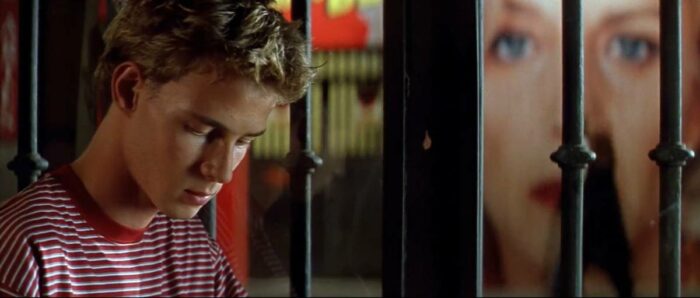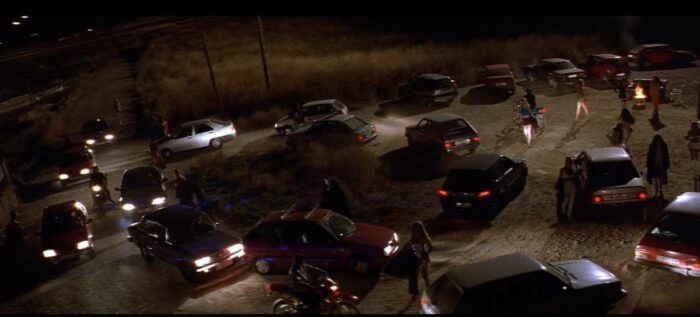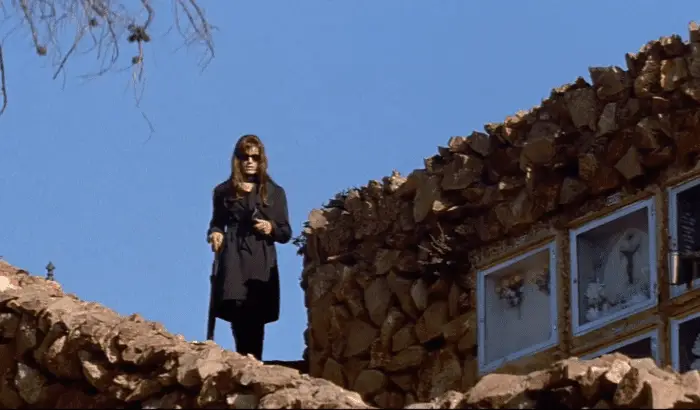Pedro Almodovar’s 1999 film All About My Mother is one of those films I could talk about indefinitely. And at the same time, all I want or need to say is extremely hard to express through words. I had the urge to mention every detail of it, every shot or sequence; with their composition, colors, remarks, references to other films or connections between different parts of the film itself. But it would make this article impossible to write and even less possible to read.
As I see it, the main theme of All About My Mother is playing the roles. We all play different roles throughout our lives. Being a woman or a man is one of them; being professional, doing our job is another; being a daughter, son, sister, brother, father, or mother—these are the roles we take up in our lives. Some people may play these roles on the stage or screen, but we all play them in our everyday life.
In the end credits of the film there is a dedication which starts with iconic actresses whom Almodovar admires, and ends with his own mother:
“To Bette Davis, Gena Rowlands, Romy Schneider…To all actresses who have played actresses, to all women who act, to men who act and become women, to all people who want to become mothers. To my mother.”
All About My Mother is filled with women who play women, men who play women, women who play mothers: mothers who have lost their children, or expecting a child, mothers who get along with their children or don’t. This is the world of women who are trying to survive in the men’s world, while those men often do not even notice them being consumed by themselves only, like Stanley Kowalski from A Streetcar Named Desire—the play which is the point of connection in the film.
The central character, Manuela (Cecilia Roth) is a mother of 17-year-old Esteban (Eloy Azorin). She is a nurse at the hospital in Madrid and participates in the organ donation program. The film opens with a death—Manuela is reporting about the potential donor who has just died. The next day, she is on the seminar playing the role of a woman who just lost her husband and is being asked for the consent to use his organs for transplantation. Manuela’s son is attending the seminar. He wants to know more about his mother because he is writing a story about her. Later that night the role Manuela was playing becomes reality—Esteban dies in a car accident and she has to go through the process for real.

Manuela has raised her son alone, Esteban never knew his father. His images are torn off all the old photographs—Manuela has clearly done everything to erase Esteban’s father from her and her son’s lives. But, Esteban needs to know his father in order to fill the empty half of his self, which is exactly the half that is missing from the photographs, as he writes in his diary. Though I think, Esteban was not quite right here—later we find out that Manuela has given him the name of his father.
I’ve said above that All About My Mother is a film about playing roles. The whole film revolves around the theatre, plays, films. The name of the film is an allusion to All About Eve with Bette Davis—one of the actresses to whom Almodovar dedicated the film. In the beginning, Manuela and her son are watching All About Eve.
The play by Tennessee Williams A Streetcar Named Desire also has great importance. It had an enormous impact on Manuela’s life, she even says it ‘has run over her life’. All crucial moments of her life—from meeting with her husband to the death of her son—are connected to this play.
Manuela met her husband (Esteban who later became Lola (Toni Cantó) in an amateur theatre group. In A Streetcar Named Desire, she played Stella, and Esteban was Stanley. It seems that the play has somehow penetrated their real life. Esteban kept the brutality of Stanley Kowalski. Later, when transitioning to woman, he never fully gave up his male identity. Acting like a woman with other men, he was jealous of his wife at the same time. No surprise that Manuela’s life with her husband became miserable and eventually she fled from Barcelona leaving Esteban/Lola—almost like Stella, with the only difference: Manuela’s child was not yet born and Lola didn’t even know about her pregnancy.
A Streetcar Named Desire became indirectly the reason for the death of Manuela’s son. On his 17th birthday, Manuela took his son to see the said play, with the actress Huma Rojo (Marisa Paredes) playing Blanche DuBois. After the performance, Esteban who wanted to get Huma’s autograph was hit by a car. I can’t help to mention that here Almodovar almost repeats the similar scene from John Cassavetes’ film Opening Night, where a 17-year-old girl who follows Gena Rowlands’ character is hit by a car. Unlike Opening Night, Huma learns about this death only a few months later.

Huma Rojo is the only major character in the film for whom acting is a profession. She is introduced with a huge poster outside the theatre. Under this poster, Manuela is waiting for her son. Then we see her in flesh, on the stage, playing Blanche. Huma not only plays her characters, but she is living through them. For instance, in the first half of the film, Huma, like Blanche, lives in dreams and illusions. She started smoking imitating Bette Davis and then it turned into her stage name (Huma means ‘smoke’). She speaks through quotes or periphrases from plays: “I have always relied on the kindness of strangers”—she repeats Blanche’s remark; later there is a whole scene in the car where she’s talking about smoke being all that is real in her life, and about the vanity of the success on the stage. It reminds me of the similar dialogue between Margo and Karen in All About Eve.
That’s what Huma is: she is an actress not only on the stage but beyond it as well. Perhaps the only time Huma stops playing is when she is with Manuela. Towards the end of the film, Huma plays Mother in Federico Garcia Lorca’s Blood Wedding. The scene of rehearsal has a definite resemblance to Manuela’s reaction on her son’s death. Huma seems to play Manuela now. Moreover, Huma has the photo of Manuela’s son. Lola gave it to her and Manuela lets her keep it—as if she understands that, in a sense, he’s now Huma’s son as well.
But let’s return to Manuela. After her son’s death, having read his diary and realizing how important it was for Esteban to know more about his father, she decides to go back to Barcelona and find Lola. There are two sequences that immediately comes to my mind upon thinking on All About My Mother. One of them starts with Manuela sitting on a train to Barcelona which is passing through the tunnel. It is followed by the views of Barcelona at night, and finally, there is the circle or the spiral of cars going round in the field somewhere on the outskirts of Barcelona, where apparently sex workers gather. This is the place associated with the basic, carnal desire, the place where one can see life in its most unadorned, rawest form. And the music, Tajabone by Ismaël Lô, which accompanies this sequence emphasizes the cyclical nature of life. This is happening with Manuela now, she is forced to return to where it all began, to what she thought to be forgotten forever.

Manuela is looking for Lola but finds Agrado (Antonia San Juan) instead. Agrado is an old friend of Manuela and Lola. She is a transgender woman who changed her gender together with Lola. Though Agrado is in some sense the opposite to Lola: if the latter has always been selfish, bringing pain and sorrow to her loved ones, Agrado always tried to bring people joy, she even chose her name accordingly. Through Agrado Almodovar can deliver the most serious ideas in a comedic way. And in this half-serious half-comic spirit, Agrado gives the key speech about identity and what being a woman means. And here is how Agrado defines it:
“It costs a lot to be authentic. And one can’t be stingy with these things because you are more authentic the more you resemble what you’ve dreamed of being.”
Agrado introduces Manuela to Rosa (Penélope Cruz), a young nun who later appears to be pregnant by Lola. Rosa is a tragic figure, her ‘role’ is being sacrificed to save others. Rosa’s parents are also worth to mention here. Her father is actually the only man in the film with male identity, but he is dysfunctional, more absent. He has dementia and cannot even recognize his own daughter. When he meets people the only thing he is interested in is statistics like weight and height. Though he is loved by his daughter, and I’m sure he loved daughter too when remembered about her existence. I think Rosa might have been closer to her father than to her mother who is more concerned about her husband than daughter, and even more concerned about her fake Chagall paintings. It seems like her relationships, feelings are often fake too, just like her paintings.
With Rosa, the subject of AIDS is introduced. I know Almodovar was criticized before for ignoring this subject in his earlier films. He addresses it now, but in his own way. The disease is brought by Lola and represents all the bad things coming from her, it’s the heritage she leaves to the little Esteban (Rosa’s son who was named after Manuela’s son). But Rosa’s involvement, her pure heart and acceptance (which is spread to Manuela) eventually makes it harmless for her child. Well, of course, I mean it symbolically—Rosa cannot directly influence the disease, but it’s her death that seems to break the circle.
I’ve mentioned the two sequences of this film which are unforgettable for me. One, as I said, is Manuela returning to Barcelona. The second is more an image than the sequence. It’s the image of Lola, dressed in black, with long hair, carrying an umbrella as a cane, going down the stairs at the cemetery. Before this moment, we had only seen her on the photograph, with a happy smile and platinum blonde hair, resembling Marilyn Monroe. Now she is like a shadow of herself, distant from everyone else, both physically and spiritually.

Lola is dying. The only thing that makes her happy now is knowing that she has a son. Lola still has to find out that she and Manuela had a son who died without knowing his father. This time Manuela keeps the promise given to Rosa and shows Rosa’s son (also Esteban) to Lola. She also gives her their son’s photograph and lets her read the record in his diary where Esteban had written about his desire to know his father, no matter who he is. I think it’s the moment when Manuela finally accepts her loss.
Almodovar rarely ends his films on a fully pessimistic note. Whatever happens, there is always hope or a happy ending implied. It might be combined with sadness, may even contain the death of an important character, but usually, life takes over. All About My Mother ends with a miracle, I don’t know how realistic it is, but it is totally justified in this film. Rosa’s son, who got HIV from his parents, is miraculously cured, he neutralized the virus and will live.


